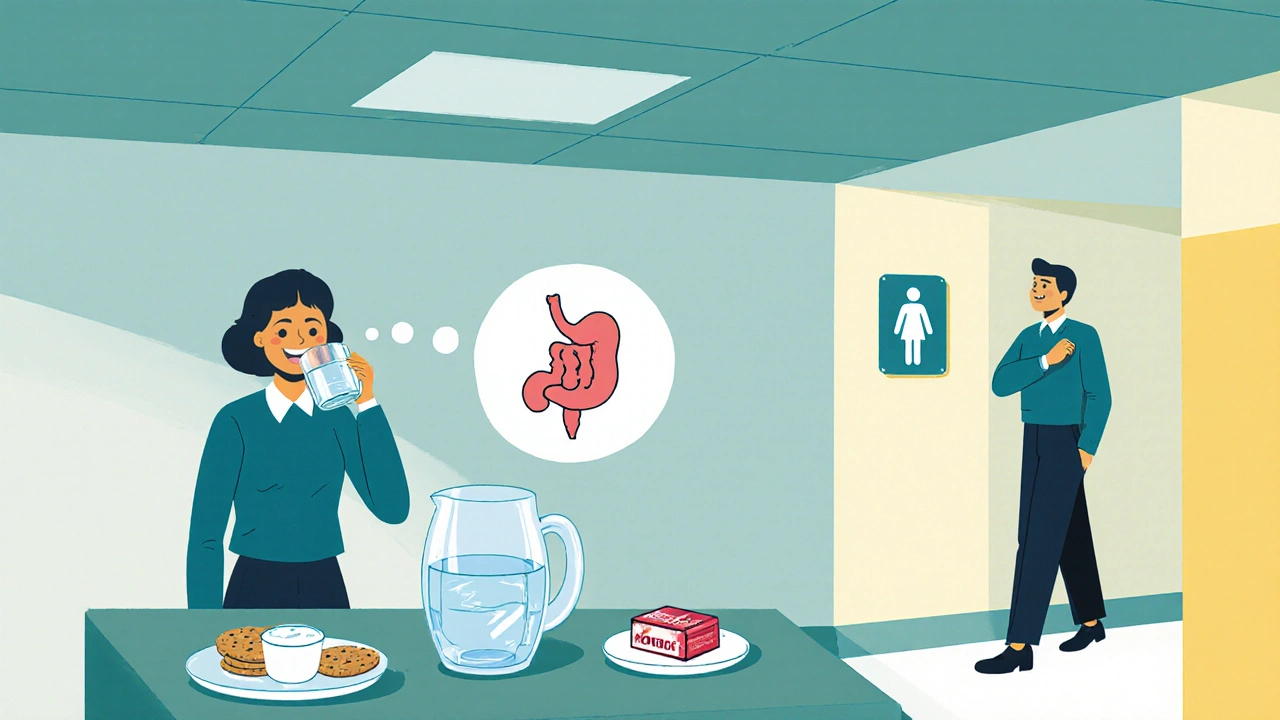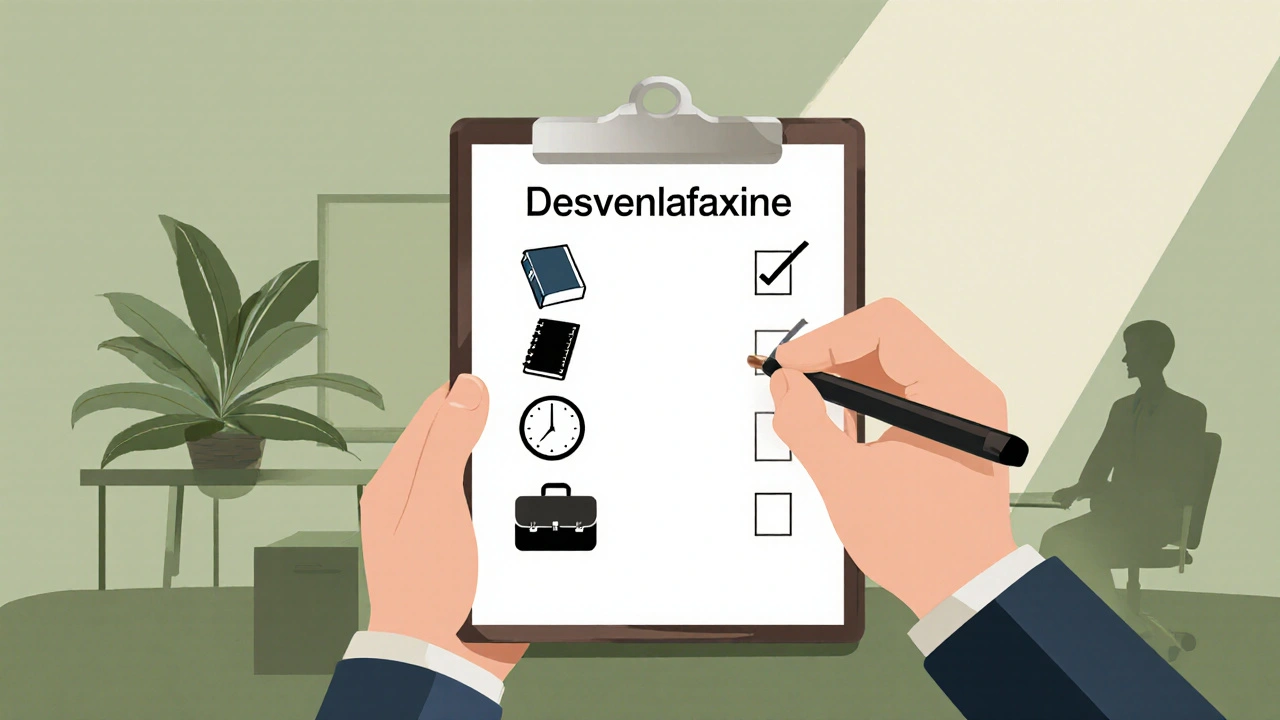When depression shows up at work, many wonder if a prescription can help keep performance steady. Desvenlafaxine is a prescription SNRI that targets both serotonin and norepinephrine to lift mood and boost motivation. It’s approved for major depressive disorder and often prescribed when other antidepressants fall short. In the following sections we’ll explore how this medication fits into a busy work life, what practical steps can smooth the journey, and how to stay safe while staying productive.
Understanding Desvenlafaxine
Desvenlafaxine, marketed under brand names like Pristiq, is the active metabolite of venlafaxine. In simple terms, it’s a refined version that the body can use directly, meaning fewer metabolism steps and often a cleaner side‑effect profile. The drug belongs to the SNRI class - short for selective serotonin‑norepinephrine reuptake inhibitor. By blocking the reabsorption of these two neurotransmitters, it leaves more of them available in the brain, helping to reduce the low mood, lack of energy, and concentration troubles that characterize depression.
How It Helps on the Job
Most people with depression report two core issues that sabotage work: mental fog and motivation loss. Desvenlafaxine typically starts showing benefits after one to two weeks, with full effect by six weeks. Users often notice clearer thinking, steadier mood swings, and a gradual return of interest in tasks. For a manager juggling meetings or a creative professional needing focus, that lift can mean the difference between meeting deadlines and falling behind.
Common Side Effects and How to Manage Them at Work
Like any medication, desvenlafaxine comes with a side‑effect checklist. The most frequent include nausea, dry mouth, insomnia, and mild dizziness. Here’s a quick guide to handling them without drawing unwanted attention:
- Nausea: Keep a bottle of water at your desk and sip slowly. Small, frequent meals-think yogurt, whole‑grain crackers-can settle the stomach.
- Dry mouth: Sugar‑free gum or lozenges are office‑friendly. A quick rinse with water before calls can keep your voice clear.
- Insomnia: Take the pill in the morning if nighttime rest is a struggle. Dim your screen an hour before bed and try a brief meditation.
- Dizziness: Stand up slowly, especially after sitting for a long time. If you feel light‑headed, a short walk to the restroom can reset blood flow.
Most side effects fade after the first few weeks. If they persist, a quick chat with your GP can lead to dosage tweaks or a switch to a similar SNRI.

Legal and Confidentiality Basics in the UK
Living and working in the United Kingdom brings specific protections. Under the Equality Act 2010, depression qualifies as a disability when it has a substantial and long‑term impact on normal day‑to‑day activities. This means employers must consider reasonable adjustments, such as flexible hours or a quiet workspace, if you disclose your condition.
Confidentiality is also a legal duty. Your medical information stays between you, your GP, and anyone you explicitly authorize, like an occupational health professional. You’re not forced to reveal you’re on desvenlafaxine unless you choose to discuss treatment needs.
Practical Workplace Strategies
Medication alone isn’t a silver bullet. Pairing desvenlafaxine with workplace tactics boosts success. Try these steps:
- Assess Your Need for Disclosure: If you require adjustments-like a later start to avoid morning sluggishness-consider a brief conversation with HR or your manager. You can frame it around “medical needs” without naming the drug.
- Leverage Employee Assistance Programs (EAPs): Many UK companies offer free counseling or short‑term therapy. Combining medication with cognitive‑behavioral therapy (CBT) often speeds recovery.
- Set Structured Breaks: A 5‑minute walk every hour can reduce anxiety and improve circulation, helping mitigate some side effects.
- Use Task‑Management Tools: Apps like Trello or simple to‑do lists break large projects into bite‑size pieces, making the mental load feel lighter.
- Stay Connected: Regular check‑ins with a trusted colleague or mentor provide accountability and emotional support.
Remember, the goal isn’t to hide your condition but to create an environment where you can perform at your best.
Drug Interactions to Watch Out For
Desvenlafaxine can interact with a handful of substances that are common in office life. Keep an eye on these combos:
- Serotonergic meds: Combining with other SSRIs, SNRIs, or certain migraine treatments (triptans) may raise serotonin syndrome risk-a rare but serious condition.
- St. John’s Wort: This herbal supplement, sometimes used for mood, can increase desvenlafaxine levels and worsen side effects.
- Blood thinners: Warfarin or newer anticoagulants may see altered bleeding risk. Discuss any changes with your doctor.
Always hand your pharmacist a current medication list, including over‑the‑counter pain relievers and vitamins.

How Desvenlafaxine Stacks Up Against Other Antidepressants
| Medication | Class | Typical Starting Dose | Common Side Effects | Notes for Workplace Use |
|---|---|---|---|---|
| Desvenlafaxine | SNRI | 50 mg once daily | Nausea, dry mouth, insomnia | Rapid onset, less metabolic variability |
| Venlafaxine | SNRI | 75 mg once daily | Hypertension, sexual dysfunction | Higher dose may raise blood pressure-monitor at work |
| Sertraline | SSRI | 50 mg once daily | Diarrhea, sexual dysfunction | Gentler on blood pressure, widely used |
| Fluoxetine | SSRI | 20 mg once daily | Insomnia, agitation | Long half‑life can ease missed‑dose worries |
Choosing the right drug depends on your health profile, side‑effect tolerance, and job demands. Desvenlafaxine often wins points for its straightforward dosing and fewer drug‑interaction hassles, especially for people on multiple medications.
Quick Checklist for Employees on Desvenlafaxine
- Take the pill at the same time each day-morning works for most.
- Track mood changes in a simple journal or app.
- Report persistent side effects to your GP within the first month.
- Know your rights under the Equality Act 2010.
- Consider adding CBT or an EAP session for extra support.
Following this list can keep you on track and help your employer understand any accommodations you might need.
Frequently Asked Questions
Can I take Desvenlafaxine without a formal diagnosis?
No. Desvenlafaxine is a prescription medication, so you need a doctor’s assessment confirming major depressive disorder or a related condition before starting.
How long before I feel better at work?
Most people notice a mood lift in 1‑2 weeks, but full concentration benefits usually emerge around 4‑6 weeks. Patience and consistent dosing are key.
Will my employer know I’m on medication?
Only if you choose to disclose it. Medical information is confidential, and you can request adjustments without revealing the drug name.
Is it safe to combine Desvenlafaxine with caffeine?
Moderate caffeine (1‑2 cups a day) is generally fine, but excessive intake can worsen anxiety or insomnia, especially early in treatment.
What should I do if I miss a dose at work?
Take it as soon as you remember, unless it’s almost time for the next dose. Then skip the missed one and continue with your regular schedule.
Managing depression on the job is a blend of medical treatment, workplace awareness, and personal habits. With desvenlafaxine providing a steady mood foundation, the other pieces-communication, routine, and support-fill in the gaps. Follow the steps outlined here, stay in touch with your healthcare provider, and you’ll be on a clearer path to productivity and well‑being.


Brady Johnson
October 26, 2025 AT 11:31Just another pill, hope it works.
Jay Campbell
October 28, 2025 AT 19:04I’ve been juggling a tight deadline schedule and the occasional brain fog. The tip about sipping water throughout the day actually saved me from a mid‑morning crash. Switching the dose to morning also seems to keep the insomnia monster at bay.
Laura Hibbard
October 31, 2025 AT 02:38Picture this: a coffee‑powered morning, then the jitters of a new prescription kicking in. The side‑effect list reads like a grocery list, but a few strategic snack breaks can tame the nausea. Dry mouth becomes less of a drama when you keep sugar‑free gum in the drawer. Insomnia? A dimmer switch on the phone screen and a short meditation did the trick for me. Bottom line, the drug isn’t a magic wand, it’s a tool you have to wield.
Lori Brown
November 2, 2025 AT 10:11Morning folks 😊, the structured break routine you mentioned is a game‑changer. I set a timer for a five‑minute walk every hour and it slices the anxiety in half. The suggestion to keep a bottle of water handy also doubles as a reminder to stand up. For anyone battling dry mouth, a mint lozenge works wonders during calls. Keep the momentum, the office will notice the boost.
Rhea Lesandra
November 4, 2025 AT 17:44When you break down the pros and cons, the picture becomes clearer. Desvenlafaxine’s quick onset can shave weeks off the typical recovery curve, which matters when you’re chasing quarterly targets. On the flip side, the early weeks can feel like a roller coaster if you don’t pace the dose. Pairing it with a task‑management app creates a feedback loop: you see mood lift and tick off deliverables. The Equality Act framework adds a safety net, but you still have to navigate the disclosure conversation wisely. Scheduling that chat with HR during a low‑stress period can prevent the ‘I‑need‑adjustments‑now’ panic. And don’t forget to log side effects in a simple notebook; patterns emerge faster than you think. Bottom line: treat the medication as part of a broader strategy, not the sole solution.
Kasey Marshall
November 7, 2025 AT 01:18In my experience the water bottle trick works great keep it on your desk and sip regularly it cuts nausea and dry mouth down to almost nothing
Dave Sykes
November 9, 2025 AT 08:51Look, consistency beats hype every time. Take the pill at the same hour daily and you’ll notice the fog lifting steadily. If you feel a dip, a short walk or a stretch session can reboot your focus. Trust the process, not the headline.
Erin Leach
November 11, 2025 AT 16:24I hear you on the nausea thing; I’ve been there and a ginger tea stash helped a lot. Dry mouth can be annoying during conference calls, so I keep a mug of water within arm’s reach. If insomnia creeps in, I switch my dose to early afternoon and avoid screens after 9 p.m. Small habits add up, and the workday feels less like a battlefield.
Erik Redli
November 13, 2025 AT 23:58Honestly, the whole ‘quick fix’ hype is overblown. Antidepressants like desvenlafaxine are not a silver bullet, they’re a piece of the puzzle. Pair them with therapy and you actually stand a chance at sustainable performance.
Tim Waghorn
November 16, 2025 AT 07:31From a regulatory perspective the Equality Act provisions are noteworthy. Employers must consider reasonable adjustments once a disability is disclosed, which includes medication‑related needs. Confidentiality remains sacrosanct; only authorized personnel may access your medical details. Aligning legal rights with workplace practices smooths the path for anyone on desvenlafaxine.
Paul Luxford
November 18, 2025 AT 15:04I appreciate the thoroughness of your overview; the legal angle often gets sidelined. In my own team we drafted a simple policy after reading similar guidance and it saved us weeks of back‑and‑forth. Maintaining that confidentiality while requesting adjustments is a delicate balance, but it’s doable. Thanks for laying out the framework clearly.
Nic Floyd
November 20, 2025 AT 22:38Your breakdown hits the right technical nodes 🚀. Leveraging task‑management tools like Trello aligns with the neurochemical boost you described, turning motivation into measurable output. The jargon around SNRI mechanisms can be dense, but you made it digestible. Keep the data‑driven mindset, it’ll pay off.
Johnae Council
November 23, 2025 AT 06:11Let’s dissect the whole premise like a forensic audit.
First, the notion that a single pill can “manage depression on the job” sounds like marketing fluff.
The brain’s chemistry doesn’t reset overnight; it rewires through a cascade of neuroplastic events that outlast any dosage schedule.
Desvenlafaxine merely tilts the balance of serotonin and norepinephrine, which may ease symptoms but doesn’t address root stressors buried in workplace culture.
You can’t ignore the fact that many employers still view mental health as a weakness, despite legal protections.
Even with the Equality Act, the bureaucratic gatekeeper model often forces employees to prove disability, turning a private struggle into a corporate paperwork marathon.
Side‑effects like insomnia and dizziness can actually sabotage productivity more than the depressive episode itself if not managed properly.
The article’s water‑bottle tip is practical, yet it glosses over the reality that constant hydration can be a distraction during back‑to‑back meetings.
Moreover, the recommendation to “take the pill in the morning” presumes a 9‑to‑5 schedule that many modern workers don’t have.
Shift workers, freelancers, and gig economy participants face dosing dilemmas that the piece barely acknowledges.
On the therapeutic front, combining medication with CBT or coaching yields statistically superior outcomes, a point the guide only hints at.
The cost factor is also omitted; prescription prices and insurance copays can create financial strain that nullifies any perceived workplace benefit.
In my view, the safest strategy is a holistic approach: transparent communication, reasonable accommodations, and a supportive team culture.
Medication should be the backup, not the frontline commander, in the battle for mental well‑being at work.
If you’re forced to conceal your treatment, you’ll carry an extra cognitive load that no drug can mitigate.
Bottom line: treat the article as a starting checklist, not a definitive roadmap, and keep questioning the assumptions it builds on.
Manoj Kumar
November 25, 2025 AT 13:44Philosophically speaking, the notion of “managing depression at work” is a social construct that masks systemic pressures. If the system demands constant output, medication becomes a band‑aid rather than a cure. Your checklist is solid, but it still centers the individual instead of reshaping the environment. A deeper cultural shift is what truly mitigates the burden.